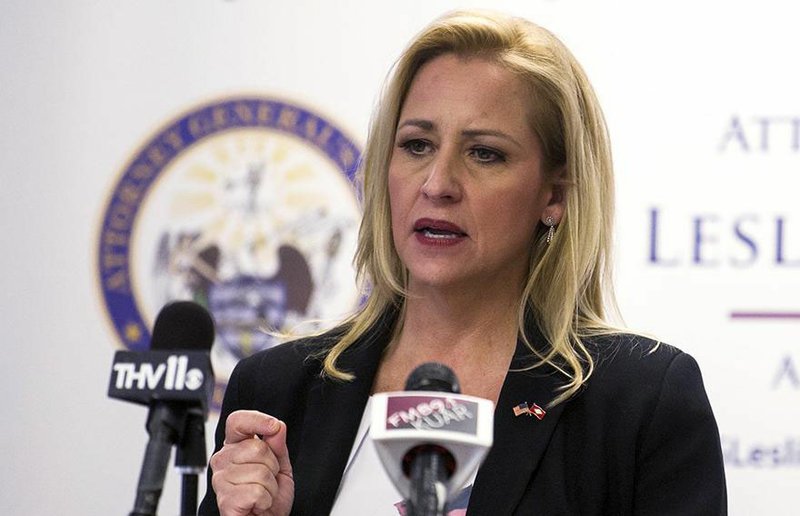Arkansas Attorney General Leslie Rutledge has filed a lawsuit against a Hot Springs woman, accusing her of operating as a "money mule" in a multimillion-dollar lottery scam that deceived dozens into sending her money that ultimately ended up in the hands of scheme operators in Jamaica.
The lawsuit filed Wednesday in Pulaski County Circuit Court accuses Jean Butler, 73, of violating the Arkansas Deceptive Trade Practices Act.
Money mules are participants in fraud -- sometimes unwittingly -- who are recruited from online job listings or dating websites and serve as important layers in a money trail by making a scam harder to follow, according to the FBI. The elderly, college students and small-business owners are especially vulnerable to being drawn into a money mule role, according to the FBI.
Rutledge contends Butler was a willing participant in the scheme.
"Do not let Jean Butler fool you that she was unknowing and that she was simply trying to help people," Rutledge said Wednesday during a news conference. "While Jean Butler may be a 73-year-old veteran, unfortunately, she became a deceptive actor taking advantage of Americans who had saved their entire lives to have this money."
Court records did not list legal representation for Butler, and attempts to reach Butler on Wednesday were unsuccessful.
Butler is a Navy veteran and the author of a dog-themed poetry book inspired by her pet-grooming business, according to the complaint. She has acted as a money mule since at least 2017 and facilitated the transfer of more than $6 million to scheme operators in Jamaica, Rutledge said.
An investigator in the attorney general's office became aware of the alleged scheme when a woman in Missoula, Mont., reported to Montana authorities that she had received a phone call from a "Thomas Williams" last February informing her that she had won a sweepstakes prize and a new Mercedes. In order to claim the winnings, the caller told the woman, she would need to mail $9,800 for handling fees and $8,000 for storage fees in the form of a cashier's check made payable to Butler, the attorney general's office said.
The investigator later received reports from state agencies in Nebraska and Kansas concerning individuals sending payments for phony prize winnings to Butler.
Roughly 50 victims from across the United States and Canada sent Butler money, according to bank information reviewed by the attorney general's office, Rutledge said.
Butler accepted checks, cashier's checks, money orders, or wire transfers into accounts at various banks from victims of the scam, and then allowed scheme operators in Jamaica to withdraw the money, according to the complaint. The attorney general's office obtained checking account information from four banks where it said Butler deposited victims' money.
Victims believed they were paying fees or taxes associated with the Mega Millions prize, the lawsuit said, but the attorney general's office said no actual Mega Millions representative would call or email someone about winning a prize.
An investigator's affidavit included with the complaint lists a record of transactions from a Citibank account in Butler's name. Between December 2018 and July 2019, Butler deposited more than $229,500 and withdrew more than $209,100, with the "majority" of the account withdrawals occurring at ATMs in Jamaica, according to the complaint.
In September 2019, according to the complaint, two investigators from Rutledge's office along with Assistant Attorney General Shannon Halijan interviewed Butler in Hot Springs, and she told them she was working for a Las Vegas company called "Mega Millions." Butler told them she had been accepting payments from lottery winners to collect income tax up front, the complaint said. She also told investigators that she was not benefiting from the scheme, according to the complaint.
Butler allowed investigators to view and photograph text messages she exchanged with "Ben" about account balances, deposits and wire transfers, according to the complaint. She also gave investigators six checks when asked if she had any checks from consumers that she had not yet deposited.
When asked what differentiates Butler from innocent participants roped into a money mule scheme, Rutledge pointed out that Butler received a package containing $5,000 in cash from an anonymous source and hidden in a magazine, which Rutledge said was payment for Butler's role in the scam.
"Ms. Butler has published a book. Ms. Butler is quite savvy. Ms. Butler is not an unknowing participant in this scheme," Rutledge said.
In order to allay suspicions about the ATM withdrawals in Jamaica, Butler would contact her bank to say that she would be traveling there so the bank would not grow concerned about the overseas transactions, Rutledge said.
However, Immigration and Customs Enforcement officials informed the attorney general's office that Butler does not have a passport and has never been to Jamaica.
The lawsuit seeks restitution for consumers, an injunction against Butler and civil penalties, which can be assessed at up to $10,000 per violation under the Arkansas Deceptive Trade Practices Act.
Rutledge said her office does not have access to information on the scheme operators in Jamaica, but her office has been cooperating with the U.S. Department of Justice and the FBI in the investigation.
Metro on 02/20/2020
